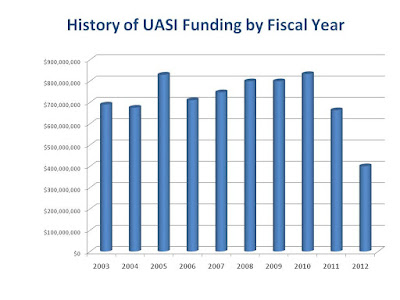FY 2012 Homeland Security Appropriations Bill
The U.S. Senate Appropriations Subcommittee on Homeland
Security approved a Fiscal
Year 2012 funding legislation bill on September 6th. The
legislation, which still needs to go through the conference committee process
and be signed by the President before it becomes law, totals $41 billion in
discretionary budget authority, $2.6 billion below the President’s request, and
$666 million (-1.6%) below FY 2011.
The good news for DHS and grantees is that this is $408 million above the House-passed bill.
The Senate rejected the House approach to grants.
In particular, The bill rejects the House proposal to eliminate the Urban Area
Security Initiative, Port Security Grants, and Transit Security Grants and
other programs and replace them with a block grant.
The bill provides $2.58 billion for state and local
grants, which is $557 million above the House level. The bill rejects the
House proposal to eliminate the Urban Area Security Initiative, Port Security
Grants, and Transit Security Grants and other programs and replace them with a
block grant.
Included in the total are the following amounts:
·
State Homeland Security Grant Program - $430
million.
o Within
the total, Operation Stonegarden - $50 million
·
Urban Area Security Initiative - $400 million
·
Emergency Operations Centers - $15 million
·
Port Security Grants - $200 million
·
Transit Security Grants - $200 million
No specific funding is provided for Citizens Corps,
Driver’s License Security, Buffer Zone Protection Program, Metropolitan Medical
Response System and Interoperable Emergency Communications grants.
Activities previously funded under these programs are
eligible in the funded programs; – $10 million to help state and local
communities cover law enforcement and other costs associated with hosting
National Special Security Events such as the Asia Pacific Economic Conference
The bill provides $350 million for Emergency Management
Performance Grants, $11 million above the FY 2011 level.
The following graphic displays the level of UASI funding
since the inception of the program.
 |
While this continues a steep decline in funding, the good
news is that the cuts were not as much as proposed by the House of
Representatives. It is not clear at this point what the number of UASI
grantees may total. Last year, the number
of UASIs was reduced from 64 to 31 – with the level of funding proposed,
this is an additional 40% cut to the program.
This may leave additional UASI cities
off the list for FY 2012.


Comments
Post a Comment